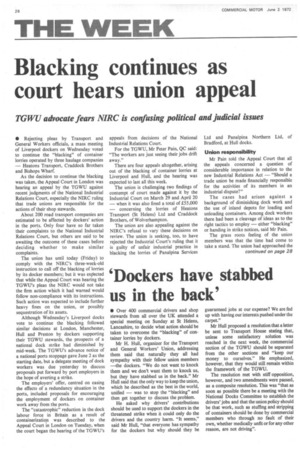Blacking continues as court hears union appeal
Page 28

If you've noticed an error in this article please click here to report it so we can fix it.
TGWU advocate fears NIRC is confusing political and judicial issues
• Rejecting pleas by Transport and General Workers officials, a mass meeting of Liverpool dockers on Wednesday voted to continue the "blacking" of container lorries operated by three haulage companies — Heatons Transport, Craddock Brothers and Bishops Wharf.
As the decision to continue the blacking was taken, the Appeal Court in London was hearing an appeal by the TGWU against recent judgments of the National Industrial Relations Court, especially the NIRC ruling that trade unions are responsible for the actions of their shop stewards.
About 200 road transport companies are estimated to be affected by dockers' action in the ports. Only four have so far taken their complaints to the National Industrial Relations Court, but others are said to be awaiting the outcome of these cases before deciding whether to make similar complaints.
The union has until today (Friday) to comply with the NIRC's three-week-old instruction to call off the blacking of lorries by its docker members; but it was expected that while the Appeal Court was hearing the TGWU's pleas the NIRC would not take the firm action which it had warned would follow non-compliance with its instructions. Such action was expected to include further heavy fines on the union, or possibly sequestration of its assets.
Although Wednesday's Liverpool docks vote to continue the blacking followed similar decisions at London, Manchester, Hull and Preston by dockers supporting their TGWU stewards, the prospects of a national dock strike had diminished by mid-week. The TGWU's advance notice of a national ports stoppage gave June 2 as the starting date, but a delegate meeting of dock workers was due yesterday to discuss proposals put forward by port employers in the hope of averting a strike.
The employers' offer, centred on easing the effects of a redundancy situation in the ports, included proposals for encouraging the employment of dockers on container work away from the ports.
The "catastrophic" reduction in the dock labour force in Britain as a result of containerization was described to the Appeal Court in London on Tuesday, when the court began the hearing of the TGWU's appeals from decisions of the National Industrial Relations Court.
For the TGWU, Mr Peter Pain, QC said: "The workers are just seeing their jobs drift away."
There are four appeals altogether, arising Out of the blacking of container lorries at Liverpool and Hull, and the hearing was expected to last all this week,
The union is challenging two findings of contempt of court made against it by the Industrial Court on March 29 and April 20
— when it was also fined a total of £55,000 — concerning the lorries of Heatons Transport (St Helens) Ltd and Craddock Brothers, of Wolverhampton.
The union are also appealing against the NIRC's refusal to vary these decisions on review. The union is seeking, too, to have rejected the Industrial Court's ruling that it is guilty of unfair industrial practice in blacking the lorries of Panalpina Services Ltd and Panalpina Northern Ltd, of Bradford, at Hull docks.
Union responsibility Mr Pain told the Appeal Court that all the appeals concerned a question of considerable importance in relation to the new Industrial Relations Act — "Should a trade union be made financially responsible for the activities of its members in an industrial dispute?"
The cases had arisen against a background of diminishing dock work and the use of inland depots for loading and unloading containers. Among dock workers there had been a cleavage of ideas as to the right tactics to employ — either "blacking" or handing in strike notices, said Mr Pain.
The grass roots feeling of the union members was that the time had come to take a stand. The union had approached the
continued on page 28
















































































































































